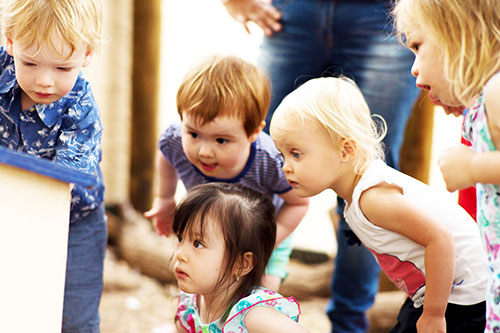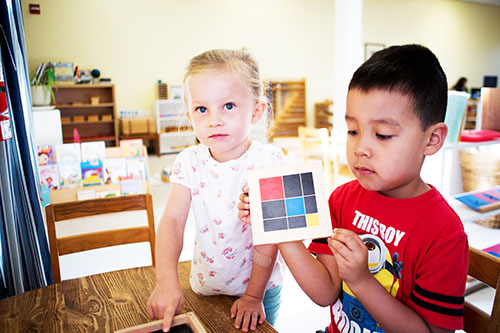By Dana McCabe, Level Director – Early Childhood
The first few weeks of school are a time of adjustment in so many ways. Excitement and joy are part of the picture, but there may well be some anxious feelings and a bit of sadness thrown in. The sad feelings are sometimes the ones least expected; let’s explore this a bit more.
Many students and their parents or caregivers feel a very healthy and normal sense of sadness at separation. Difficult separations are often rooted in fear of the unknown when it comes to a new situation. It can also relate to something that is happening at home, or to something that the child has just experienced before arriving at school. Especially for young children, it is hard to know or for them to express exactly where the cause lies. No matter what the cause, it is difficult for everyone involved.
As teachers, we have the ability to nurture the child who is upset as well as provide support to the parents who feel heartache when their child is distressed. Below are some strategies that may be helpful to you as parents as you do your best to support your children to ease any misgivings they may have. Among the most important of these is a quick drop-off and a timely arrival. Please remember, difficulties with separation is a phase, it is perfectly natural, and it will pass.
- Establish a goodbye routine ahead of time. Children crave routine and parents who establish (and practice) a consistent goodbye routine usually have better luck with successful goodbyes.
- Make your goodbye prompt and positive, and be clear you are leaving. Tell your child: “I am going to work now. I will see you after (nap, lunch, work – whichever is appropriate to your schedule).”
- This sounds easy, but can often be one of the most difficult things to do. Giving your child “one more minute” together simply prolongs the inevitable. The best thing you can do is give your child a hug and kiss, say, “I love you!” Don’t ask or wait for permission to leave. They have a choice about how to respond but not about whether you are leaving.
- Be on Time. Children often get anxious when rushed, so do your best to give your child extra time in the morning to get ready and to arrive at school on time with their classmates. Additionally, it is important to be punctual when picking up your child. It is easy to lose track of time, but no matter who is picking your child up, whether it is you or someone else, make sure you are there on time. If you are late, it can cause your child even more anxiety and make dropping off the next time that much harder.
- Trust your child’s teachers. This may be difficult to do when you do not yet know these people that well, but keep in mind that Early Childhood educators have chosen this profession because they enjoy working with young children and they have a wealth of ideas and strategies to help settle a child who is feeling upset. The strategies might involve anything from a nurturing hug, redirection, pairing them up with another classmate, or simply keeping the child close until they are ready to engage with an activity.
- Acknowledge how your child is feeling. It is important to accept and respect your child’s temporary unhappiness as it is very real and very normal. Say things like “I know you feel sad when Mommy leaves, but you will have a good time, and I will be back very soon.” Avoid the temptation to pressure your child not to cry or to offer bribes for “good behavior”. Learning to cope with sadness is an important learning process for your child.
- Ask for help. Sometimes stepping back from the dropoff routine can make a huge difference in how your child reacts. Often, a child who experiences difficult separation with one parent is absolutely fine if the other parent does the drop-off. You could also try having another relative, close friend or grandparent give it a try for a few days.
- Do not linger. Lingering will make your child sense there is something wrong with your leaving or with the community you have left them in. It may cause them to become much more scared or upset. I know how reassuring it can be to stay to peek at your child through the fence. However, for the child, it can be unsettling. As a child, seeing your parent when you are upset, but not being able to be with your parent is not a good feeling. One suggestion is to leave quickly and, if you are feeling really uneasy, call the school in 15-20 minutes to ask how your child is doing. Chances are, your child has settled within a few minutes.
- Stay calm and be enthusiastic. Parents play a deciding role in their children’s outlook and approach to starting school. Modeling appropriate behavior is key to a smooth transition from home to classroom, so try very hard to ensure your child does not sense your unease. Be positive; your child can sense your own separation fears. If you’re enthusiastic, your child will be, too. Talk about how much fun school will be, talk about their friends and classmates. Discuss the different activities they might want to choose, and reinforce how lucky they are to have such a special school and that you cannot wait to hear about their day when you pick them up.
- Know that your child is in excellent loving care. They may cry at first but will soon adjust. It is our Nature to Nurture!






